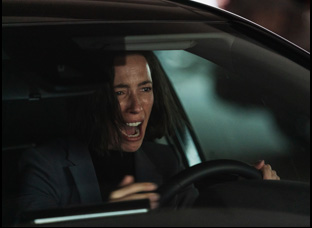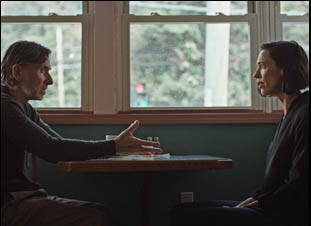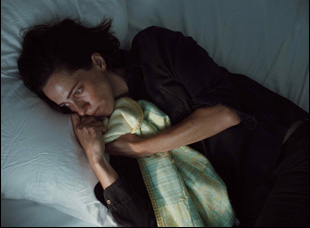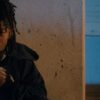It may seem like a mixed blessing any time Andrew Semans comes up with a new idea for one of his films when he is often drawn to what scares him the most for inspiration. He hadn’t become a parent himself yet when he first began thinking of Margaret (Rebecca Hall), the mother at the center of “Resurrection,” but as someone unusually skilled at how fear can eat away at someone’s soul to go by his wicked debut “Nancy, Please,” he found the notion of someone in the difficult process of letting go of their child – in this case, her teenage daughter Abbie (Grace Kaufman), soon bound for college – to be quite fertile territory for a thriller, particularly if Margaret’s dread stemmed from something she had experienced herself.
If Semans throws audiences for a loop in “Resurrection,” it could be due in part to how the writer/director was in for one himself after first putting pen to paper and learning of a friend who was involved in a toxic relationship. That opened the door for an unusually insightful revenge drama that is at once rooted firmly in the psychological warfare occurring inside Margaret’s head and going well beyond what anyone could imagine as she rencounters David (Tim Roth), a man she met as a 19-year-old and now questions the power dynamics involved in the affair that followed when he had two decades on her at the time. While she has long been able to compartmentalize what happened to her, achieving success in the pharmaceutical world and raising a daughter on her own, “Resurrection” finds Margaret dangerously alone in her thoughts as Abbie’s about to leave and David has come back, concerned that the past could repeat itself in any variety of ways.
However, no one would ever accuse “Resurrection” of going down a familiar path, with a fearless Hall setting the tone as vengeance-minded Margaret and Semans daring audiences to keep up as the certitude driving his lead character starts to look a little like madness. With the filmmaker gifted at depicting how a seed of doubt can grow into a full-blown obsession, “Resurrection” becomes every bit as all-consuming, so potent that when its premiere at Sundance had to go all-virtual due to COVID concerns earlier this year, you could practically hear the screams echoing throughout its gasp-inducing finale if they weren’t happening firsthand and thankfully, that experience can now occur in theaters across the country when it opens this week. Recently, Semans graciously took the time to talk about running towards the wild thoughts he had for “Resurrection,” finding a committed partner in Hall and filming one of the film’s signature sequence, a transfixing seven-minute-long monologue that makes the hairs on the back of your neck stand with words alone.
 I couldn’t help but see this as a sibling to “Nancy, Please,” where there’s this all-consuming obsession bedeviling the lead character – in that case, a grad student wondering if his old roommate has hidden his annotated copy of “Little Dorrit” from him. Are you actually a bit obsessive yourself?
I couldn’t help but see this as a sibling to “Nancy, Please,” where there’s this all-consuming obsession bedeviling the lead character – in that case, a grad student wondering if his old roommate has hidden his annotated copy of “Little Dorrit” from him. Are you actually a bit obsessive yourself?
I don’t think I’m an obsessive person particularly or it’s a particular preoccupation of mine. I’ve certainly written a lot of material about non-obsessive personalities and these are just the ones that have happened to have been made. Movies about people who feel very, very strongly about something and are very single-minded in their pursuit of that are always engaging, so maybe that’s just seductive when I come up with a character that’s fixated on something, I want to pursue that because it’s intoxicating when somebody else is so monomaniacal.
When this goes to some seriously wild places, is it difficult to give yourself permission to follow a story like this to its end?
Absolutely. And when I wrote this script a long time ago, the first draft of the script, I thought it was too far out for people to take a serious interest in. The premise was too strange and I wrote it for myself as an antidote from other things that I was writing that I didn’t feel great about and meant to be more commercial. I wrote this really more just for me, giving myself total permission to pursue whatever interested me in the moment. It turned out to be the script I’ve written that got the most attention and the most interest, which came as a big surprise to me, but it was incredibly gratifying that what I felt closest to and most liberated writing was what worked out the best.
Structurally, it was interesting to me in two particular ways – the age range of the three characters creates a really interesting dynamic in terms of their attitude towards what unfolds and you’ve said vigilante films were an influence, but this subverts the rules of that genre. Were those ideas foundational in helping to give shape to this?
Yeah, it always was. David was always significantly older and meant to be a kind of paternal figure, someone who took advantage of a significantly younger woman at a vulnerable time in her life and I really like the idea of working in familiar genres or circumstances and images and try and find a way to make that fresh or tiptoe up to cliche and try and smuggle in critical elements without robbing the genre of what makes it exciting and enticing in the first place.
 How did Rebecca Hall come to mind?
How did Rebecca Hall come to mind?
I have long been a tremendous fan of her work and and I can’t think of any actor living or dead that’s better suited to this role than Rebecca Hall, so she was top of mind and I was just ecstatic when she read the script and responded to it and wanted to do it, which she did quite readily. It still took us a while to get the film off the ground once she was involved, but it was a very easy process in terms of her connecting with it and then she is so prepared, so smart, and has such incredible acting chops and such a raw, intuitive understanding of the script that it left me with very little to do in terms of Margaret. She came locked and loaded and ready to go every day and everything she brought and prepared, it was almost always precisely what I was hoping for or better.
So many things in this movie could go wrong if not performed by Rebecca Hall. [laughs] She gave us license to do everything we wanted to do in terms of the character and the script because we knew she’d be able to sell it. A lot of the stuff in this movie in lesser hands would be potentially disastrous – for example, there’s a very long, single-take monologue in the middle of the movie, which is a very, very risky to do and it’s very scary, but with Rebecca, you can land it and she allows you bold or unconventional or eccentric choices because she redeems them or dignifies them or somehow finds a way to make them work. That was just a wonderful gift.
Is it true there might’ve been a thought of intercutting flashbacks into that monologue?
I inserted flashbacks into the script during the monologue at a certain point because I was nervous that potential partners would come across unbroken three-page monologue in the script and would just think it’s impossible or preposterous, so I wanted to break it up to give the impression it’s cinematic or we’re going to cut away. But I never really wanted to do that. My hope was I could do this all in one take, but we thought, “Okay, in an emergency situation, if we can’t land the plane, if we get this material, we can use it.” But when we shot that scene with Rebecca, it was immediately evident that cutting away would just fuck it up. We could just stay on her and it would be engaging and fascinating and cinematic without any other bells and whistles, so we never shot any flashback material and I was able to do what I wanted to do from the get-go.
 In general, it seems like you were stripping things back to their bare essence and even though this wasn’t intended to be shot under pandemic conditions, did you find it helped create a simplicity?
In general, it seems like you were stripping things back to their bare essence and even though this wasn’t intended to be shot under pandemic conditions, did you find it helped create a simplicity?
Oh no. [laughs] I can’t say that shooting in COVID was a benefit to the movie. It was an obstacle. It sucks. Anybody who shot during COVID will tell you that. We had a very short shooting schedule and had to do everything very quickly and that’s partially due to COVID, partially due to other things and that did reinforce this idea that we’re going to make a film that is fairly simple – fairly spare, stripped down in terms of the coverage, in terms of how we’re shooting the movie, but I always wanted to make a fairly minimal movie at least in terms of the visual strategy of the movie.
My idea with this was that the visual presentation was really the facts of the case – to really be realistic and not particularly impressionistic and be quite spare to be the objective reality, but then the sound is meant to be Margaret’s subjective experience [where] we gave ourselves much greater permission to be stylized. To us, the sound was in Margaret’s head, and I really liked this idea of the contrast between the very realistic, almost mundane visual presentation and a much more florid audio environment.
You’ve made such a perverse crowd pleaser, what’s it like seeing it with an audience?
I didn’t get a chance to see it with an audience up until a couple weeks ago because it was part of Sundance London and then I saw it again at Rooftop here in New York. It’s so much better with an audience. Oh my gosh. It’s so much more fun. I think this is true of almost every movie, but particularly a movie like this, until you see something with an audience, you really have no idea what’s working and what isn’t, so it really was a great relief seeing certain moments seem to land in the way we wanted them to with an audience. That was very gratifying.
“Resurrection” opens in theaters on July 29th and be available on demand on August 5th. It will be available to stream exclusively on Shudder in November.




